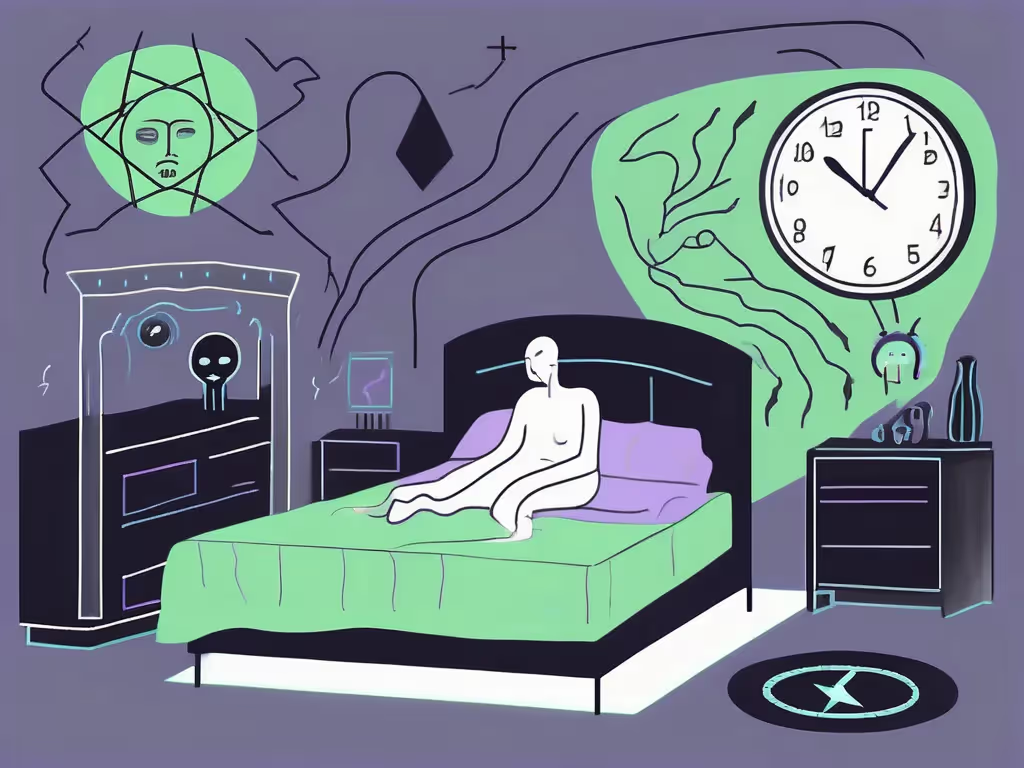Do you find yourself tossing and turning at night, your mind racing with worry and anxious thoughts? If so, you're not alone. Anxiety affects millions of people worldwide, and it can have a profound impact on our daily lives. But could there be a natural solution to ease anxiety and promote a good night's sleep? In recent years, melatonin has gained popularity as a potential remedy for anxiety. In this comprehensive article, we will explore the science behind melatonin and anxiety, its potential benefits, and how to use it effectively. So let's delve into the fascinating world of melatonin and discover if it can truly help with anxiety!
Understanding Anxiety: Causes and Symptoms
Anxiety is more than just feeling stressed or worried. It's a complex condition that can be caused by a variety of factors, including genetics, brain chemistry, and life experiences. While it's a natural response to stress, excessive anxiety can interfere with our daily functioning and overall well-being.
When it comes to understanding anxiety, it's important to delve deeper into its causes and symptoms. By exploring these aspects, we can gain a better understanding of how anxiety affects us and what we can do to manage it effectively.
What is Anxiety?
Anxiety is a psychological and physiological response to a perceived threat. It triggers the body's "fight or flight" response, causing heightened alertness, rapid heartbeat, and sweaty palms. While it can be a normal part of life, chronic anxiety can be debilitating and impact our ability to function optimally.
It's important to note that anxiety is not a one-size-fits-all condition. Each person may experience anxiety differently, with varying levels of intensity and duration. Some individuals may have occasional bouts of anxiety, while others may struggle with chronic anxiety that significantly affects their daily lives.
Common Symptoms of Anxiety
Anxiety manifests itself in various ways, and symptoms can range from mild to severe. Some common symptoms include constant worrying, restlessness, irritability, difficulty concentrating, and sleep disturbances. These symptoms can significantly impact our overall quality of life and well-being.
Additionally, anxiety can also lead to physical symptoms such as muscle tension, fatigue, and even shortness of breath. These physical manifestations of anxiety further highlight the interconnectedness of our mind and body.
The Impact of Anxiety on Daily Life
Living with anxiety can be challenging. It can affect our relationships, work performance, and even our physical health. Anxiety can lead to social withdrawal, difficulty making decisions, and physical symptoms such as headaches and stomachaches. It's crucial to find effective strategies to manage anxiety and improve our overall well-being.
Furthermore, anxiety can have a profound impact on our mental well-being. It can contribute to feelings of low self-esteem, self-doubt, and a constant sense of unease. These emotional effects of anxiety can make it even more challenging to navigate through daily life and maintain a positive mindset.
Fortunately, there are various approaches to managing anxiety. From therapy and counseling to lifestyle changes and self-care practices, individuals can find strategies that work best for them. It's important to remember that seeking professional help and support is never a sign of weakness but a proactive step towards better mental health.
In conclusion, anxiety is a complex condition that can have a significant impact on our lives. By understanding its causes and symptoms, we can develop effective strategies to manage anxiety and improve our overall well-being. Remember, you are not alone in your journey, and there is support available to help you navigate through anxiety and lead a fulfilling life.
An Overview of Melatonin
Now that we have gained a deeper understanding of anxiety, let's explore melatonin and its potential role in anxiety relief. Melatonin is a hormone produced naturally by the pineal gland in the brain. Its primary function is to regulate our sleep-wake cycle, signaling to our bodies when it's time to sleep and wake up.
What is Melatonin?
Melatonin is often referred to as the "sleep hormone" as it plays a vital role in regulating our sleep patterns. It's produced in darkness and suppressed by light, which is why our melatonin levels rise in the evening, making us feel sleepy, and decrease in the morning, signaling wakefulness.
The Role of Melatonin in the Body
Beyond its role in sleep regulation, melatonin also acts as a powerful antioxidant, protecting our cells from damage caused by free radicals. It has also been linked to immune system function, reproductive health, and mood regulation.
Common Uses of Melatonin
While melatonin is typically used as a sleep aid for those with insomnia or jet lag, its potential benefits extend beyond sleep. Some studies suggest that melatonin may have anxiolytic properties, meaning it may help reduce anxiety symptoms and promote relaxation. However, more research is needed to fully understand the effects of melatonin on anxiety.
The Science Behind Melatonin and Anxiety
To uncover the potential benefits of melatonin for anxiety, scientists have conducted numerous studies to explore its impact on the brain and mental health. These studies have yielded intriguing results and shed light on the complex relationship between melatonin and anxiety.
How Melatonin Affects the Brain
Melatonin interacts with various receptors in the brain, including those involved in regulating anxiety and stress response. It modulates the release of neurotransmitters, such as gamma-aminobutyric acid (GABA), which has calming effects on the brain. By enhancing GABA activity, melatonin may help reduce anxiety levels.
Studies on Melatonin and Anxiety
While research on melatonin and anxiety is still in its early stages, some studies have shown promising results. For instance, a small study published in the Journal of Clinical Psychopharmacology found that melatonin supplementation significantly reduced anxiety symptoms in individuals with generalized anxiety disorder.
The Potential Benefits of Melatonin for Anxiety
Although more research is needed, early findings suggest that melatonin may offer some relief for those struggling with anxiety. In addition to potentially reducing anxiety symptoms, melatonin may also improve sleep quality, making it a beneficial option for individuals with anxiety-related sleep disturbances.
How to Use Melatonin for Anxiety
If you're considering using melatonin to alleviate anxiety symptoms, it's essential to know how to use it effectively. While melatonin is generally safe for short-term use, it's crucial to follow proper dosage guidelines and timing recommendations.
Recommended Dosage
The appropriate melatonin dosage can vary from person to person. It's advisable to start with a low dose, typically around 1-3 milligrams, and gradually increase if necessary. Consult with a healthcare professional to determine the best dosage for your specific needs.
When to Take Melatonin
The timing of melatonin supplementation is crucial. It's best to take melatonin approximately 30 minutes to an hour before bedtime. This allows the melatonin to take effect and assist in falling asleep and achieving a restful night's sleep.
Potential Side Effects
While melatonin is generally safe for short-term use, it can cause side effects in some individuals. These side effects may include drowsiness, changes in mood, headache, and gastrointestinal symptoms. If you experience any adverse effects, discontinue use and consult with a healthcare professional.
In conclusion, melatonin shows promise as a potential aid in managing anxiety symptoms. While more research is needed to fully understand its effects, it may offer a natural and non-habit-forming option for those seeking relief from anxiety-related sleep disturbances. If you're considering using melatonin, it's crucial to discuss it with your healthcare provider and follow proper usage guidelines.
Unlock a better night's sleep and discover inner calm with the Aura Health App. In addition to considering melatonin, incorporating mindfulness and relaxation techniques into your daily routine can provide valuable support in managing anxiety. The Aura Health App offers a wide range of meditation and sleep improvement exercises to help you relax, reduce stress, and improve your overall well-being. Download the app today and experience the transformative power of mindfulness.
Aura is Your All In One App for Meditation, Mindfulness Wellbeing
Find peace every day with one app for your whole well-being. There is no one-size-fits-all solution to mental well-being. Aura is the first all-in-one wellness app that learns how to best help you. Discover an endless library of expert-created tracks for your well-being, all taught by the world’s best coaches, therapists, and storytellers. With Aura's personalized recommendations, you can find peace every morning, day and night.



.webp)






.avif)

%20(1).avif)


.avif)
.avif)
.webp)


.avif)


















































































































.avif)

















.svg)









